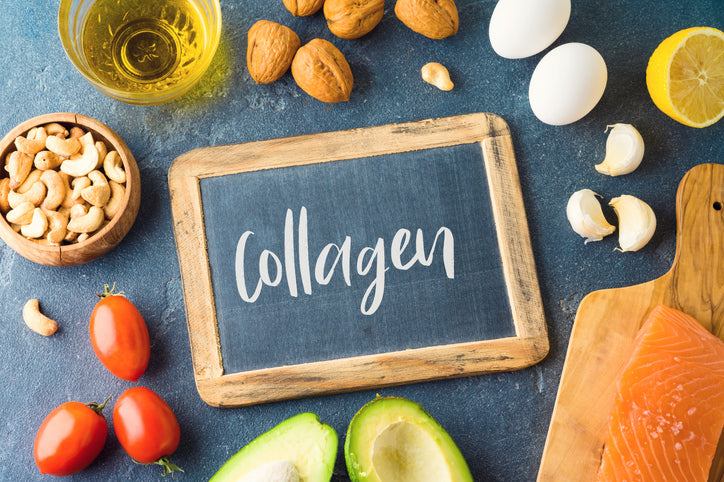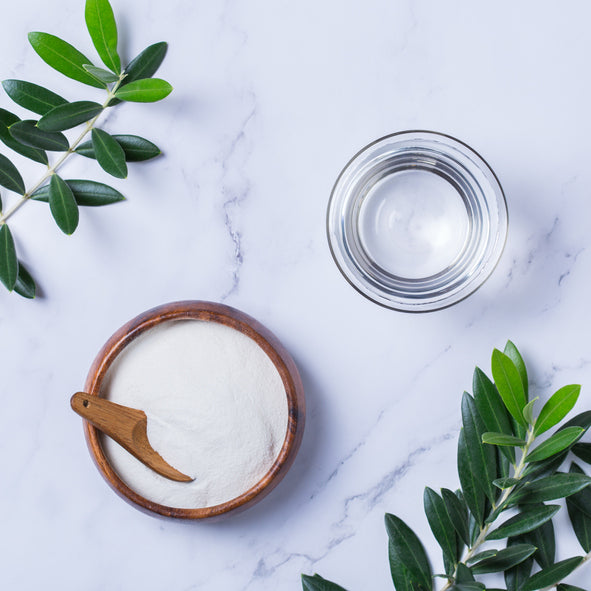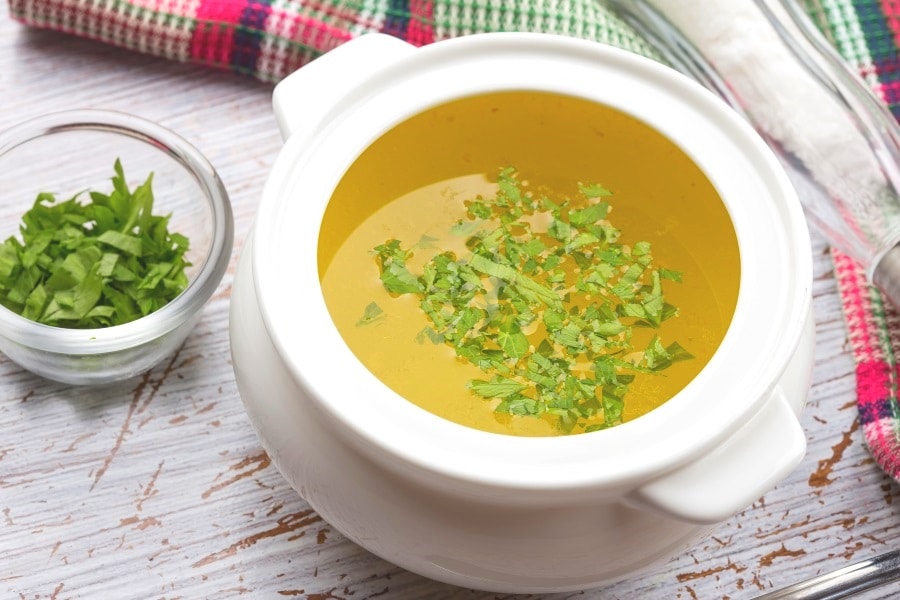
How Can I Boost My Collagen?
Collagen deficiency is no laughing matter. There is an array of benefits to enjoy if you’re mindful of your collagen reproduction, including youthful skin, freedom from joint aches, and a healthy digestive system. Sounds intriguing, right? So, how do you know if you have a collagen deficiency? What can you do to increase collagen and promote collagen reproduction before signs of premature aging and aching body parts kick in? Settle in for a few minutes and learn how you can help prevent a collagen deficiency, increase collagen naturally, and reap the rewards of collagen.
The Basics of Collagen
Your body naturally produces collagen, making up roughly 33% of its protein source. Collagen is necessary, as it plays a vital role in your body's health and wellness. It doesn’t hurt that it also provides desirable weight and beauty benefits too. It keeps your skin looking radiant, preventing and diminishing the appearance of those dreadful fine lines and wrinkles you hate seeing in the mirror. It's a significant force in the health of your nails, hair, and connective tissue, and much more. And if you don’t think a collagen deficiency affects you, think of it this way - without protein, your skin won’t "bounce back," while your blood vessels and tendons become frail. Collagen provides healing benefits as a potent anti-inflammatory, able to protect you from issues including:
- Poor immune response
- Protecting your body from hemorrhaging sepsis, and endotoxins
- Liver and renal damage from toxins and drugs
-
Leaky gut
That’s why collagen reproduction is essential and plays a critical role in your overall health, wellness, and appearance. Pretty big deal, wouldn’t you agree?
Collagen Synthesis
Collagen-boosting superfoods found in bone broth, collagen protein powders, and gelatin are all incredible options to help prevent collagen deficiency. While these options are full of essentials, you need to enlist the help of a variety of additional vitamins and nutrients. Incorporating a nutrient-rich diet of fruits, veggies, grass-fed meats, and wild fish helps to increase collagen levels significantly. These anti-inflammatory foods contain powerful antioxidants your body is craving to boost collagen reproduction.
Vitamin C is vital for the synthesis of collagen. By increasing the amount of vitamin C in your daily diet, you can significantly increase your body’s collagen reproduction. Vitamin C is a limiting factor; if you don’t have a sufficient amount, your collagen reproduction line shuts down. Keep in mind, your body is unable to produce vitamin C, so getting an adequate supply from your food sources is imperative. Try adding foods rich in vitamin C, including tomatoes, citrus fruits, kiwis, bell peppers, and strawberries, to increase and maintain your collagen levels.
How Do I Know If I Have a Collagen Deficiency?
Staying in tune with your body will help you combat many health and wellness issues. It will also offer signs of a collagen deficiency, so pay attention. Your body is built to give off warning signs to alert you when you need to step up your self-care and increase collagen. But don’t wait to experience the signs and symptoms of a collagen deficiency. Supporting your body's need for collagen reproduction can save you from many health concerns, starting with and usually stemming from inflammation. Yep, it's the root of most of your aches, pains, discomforts, and aging woes.
If you’re beginning to notice fine lines, dark circles, and sagging skin, it’s time to address your collagen deficiency. Do you tend to have minor injuries that just don’t seem to heal as quickly as they once did? Are you dealing with fatigue or bloating issues? How about leaky gut symptoms? These are all warning signs from your body screaming at you to increase collagen, and fast! When your body’s natural collagen level decreases, it's up to you to help support its collagen reproduction. Unless, of course, you’d like to hang on to that stubborn belly fat, dull hair, and extreme fatigue.
Additional signs of collagen deficiency are also the result of:
Stress
When you are under stress, it wreaks havoc on your body in ways you may not realize. With stress comes free radicals, causing inflammation and oxidative stress. Stress factors may potentially destroy your collagen and collagen reproduction. Finding ways to relax and create a more stress-free environment can add health and years to your life. And who doesn't love the sound of that? The less stress you let in, the quicker you will increase collagen levels.
Lack of sleep
Sleep plays a critical role in your body’s collagen reproduction. Your body repairs and rebuilds collagen best when you're asleep. You'll see tremendous results when you're able to get in a consistent seven to nine hours a night. Help beat collagen deficiency by getting in those z’s.
Toxins:
While I understand you can't avoid all toxins, there is plenty you can and should avoid, to protect yourself from collagen deficiency. By lowering your exposure to daily toxins found in certain personal care products and home cleaners, processed foods, and pesticides, you help preserve the integrity of your collagen reproduction abilities. Toxins are just one of those pesky nuisances that can send you flying towards collagen deficiency, so be mindful of limiting all you can.
Age:
We all hate to admit it, but age has its hand in just about everything. Collagen deficiency is no exception. As you age, your body begins to slow down its production of collagen. It’s natural, though, so before you panic, trust me when I say there are many natural alternatives to increase collagen.
Cellular damage:
Constant contact with free radicals, including excessive exposure to the sun, smoke, or pollution, can cause collagen destruction. Damage from free radicals results in collagen deficiency. If your body lacks sufficient antioxidants, your defenses will fail, and collagen levels are at considerable risk. Ensuring your body has the necessary antioxidants to help prevent collagen deficiency is essential, so take it seriously, my friends. To help preserve and increase collagen in your body, support collagen reproduction, and replenish antioxidants, maintain healthy levels of coenzyme Q10, vitamin E, and vitamin C.
Various medical conditions:
As if you don’t have enough to worry about, there are medical conditions that may prevent your body from absorbing necessary vitamins and nutrients to support collagen reproduction. Unfortunately, these conditions can lead to the destruction of your collagen.
Best Sources for Collagen Reproduction
Before you panic, know that there are plenty of ways you can increase collagen safely and naturally. By implementing a few lifestyle changes, you can maintain and increase collagen levels successfully.
Collagen Protein Powder Supplements
Daily collagen supplements are fantastic, and let’s face it, a convenient option. If you’re looking for a delicious introduction to collagen protein powders that effectively increase collagen, you’ll love my Chocolate Almond Collagen Shake. It strengthens your hair and nails, adding body and luster you won’t want to live without. It restores your skin’s elasticity and radiant, healthy glow. Collagen protein powders easily dissolve in hot or cold water, so your options are pretty limitless. Add it to your morning coffee for a tasty boost. I even enjoy adding the flavorless supplement to my favorite recipes. Are you on the go a lot? Make yourself a smoothie or shake to take and sip in the car or grab a packet to mix later. You really can't ask for a more straightforward option. You’re sure to reduce collagen deficiency with ease.
Gelatin
Gelatin is essentially cooked collagen and found in abundance in bone broth. Gelatin also comes in a pure powder form. It works well in a variety of recipes and helps increase your collagen levels when using consistently.
Bone Broth
You know I use bone broth for everything, so naturally, it’s my number one weapon for preventing collagen deficiency. Sip on a cup of bone broth to fill your body with essential nutrients and increase collagen levels. You’ll reap all the rewards collagen has to offer with minimal effort.
Foods to Increase Collagen Naturally
Load up on those veggies to help increase collagen levels the natural way. Veggies are a beneficial way for you to get those crucial antioxidants that prevent collagen deficiency and destruction. Toss in lots of red vegetables, to add lycopene to your diet. You’ll protect your skin from sun damage and increase collagen production. Yes, please!
Omega 3-Rich Foods
Omega-3-rich foods, like fish and lean grass-fed meats, provide excellent benefits towards collagen reproduction. Enjoy mackerel, salmon, and tuna or grass-fed meat to help protect the fatty membrane around your skin cells. Omega-3s are known for plumping up the cells, giving you desirable, youthful skin. Omega 3s will also help reduce inflammation throughout your body while providing essential amino acids to support firmness. Try out this yummy fish bone broth option. I know you’ll love it.
Copper
I bet you didn’t know copper is critical in collagen reproduction. It can activate the enzyme that stimulates production, so add this to your list and start boosting that collagen level!
Vitamin C
I’m going to be very blunt here... if your body doesn't have adequate amounts of Vitamin C, it's not going to produce collagen. Period. It's one crucial step you can’t afford to skimp on. Make it a point to provide your body with a steady supply of vitamin C. I don’t want to hear any excuses because it is everywhere. Add broccoli, tomatoes, and various citrus fruits to your meals, smoothies, and snacks. Your body will thank you in ways you won’t believe!
Sulfur
It's vital to add sulfur-rich foods to your diet, like eggs, onions, and cauliflower. Sulfur helps increase collagen levels, so try new recipes and experiment with cabbage, bok choy, shallots, and leeks if they aren’t already a part of your routine.
White Tea to the Rescue
While it may not have been one of your guesses, white tea is high on the collagen reproduction list. Studies show drinking white tea helps in the prevention of collagen breakdown. It will protect your skin’s protein and elastin while helping prevent additional signs of aging. I can’t imagine not including white tea in your daily routine. You’re adding it to your shopping list, aren’t you?
Berries
Is anyone actually in shock over this one? I mean, berries have always been put on a pedestal for their antioxidant powers. I don't care about which berries you choose - just make sure to add these little powerhouses to your daily diet to help you fight off free radicals while providing a considerable collagen reproduction boost.
Garlic
Mmmmm…one of my favorite additions to recipes is the small but mighty garlic powerhouse. It provides an array of health benefits, which is why it's always on hand at my house. Garlic contains taurine and lipoic acid, which together, rebuild your damaged collagen. I should mention, garlic also contains sulfur.
Vegetarian and Vegan Alternatives for Collagen
Don't worry; I have fabulous options for all you vegans and vegetarians out there. While this shouldn't surprise you, you can increase collagen production by filling up on dark leafy greens. Kale and spinach offer antioxidants that will protect you from collagen destruction by free radicals. And don’t forget to add those red veggies to increase collagen production. Toss in some orange options, like carrots, sweet potatoes, and pumpkins, which provide tons of vitamin A.
Collagen Protein Powder Alternatives
Collagen protein powders contain a concentrated source of vital amino acids your body needs for collagen reproduction, primarily glycine and proline. And while science shows that collagen supplementation is highly effective, there are plant-based vegan and vegetarian collagen options that boost amino acids.
Plant-Based Sources of Glycine & Proline
Glycine and proline are “conditional” amino acids. When conditions are ideal, your body can create them internally. However, conditions are not typically suitable due to obstacles like our stressful lives and sleepless nights. Ensure you get your fill of these amino acids from the foods you eat by selecting options rich in glycine and proline, including:
High in plant-based glycine:
- Banana
- Cucumber
- Kale
- Kiwi
High in plant-based proline
- Alfalfa sprouts
- Asparagus
- Chives
- Watercress
What is Lysine?
Lysine is another collagen boosting nutrient to add to your diet. It’s an amino acid that supports collagen synthesis but isn’t as readily available in plant-based foods. Try adding these foods to your recipes to increase collagen levels:
- Lentils
- Lima beans
- Pistachios
- Potatoes
- Pumpkin seeds
- Tempeh
- Quinoa
The Bottom of Line of Boosting Collagen
While collagen deficiency can be a scary thought, it’s comforting to know there are ample ways to support collagen reproduction and increase collagen levels though safe and useful sources. By changing your daily diet and adopting the right lifestyle, you will reap the rewards you deserve. And I’m here to support your journey in every way I can. So, if you’re ready to replenish your collagen, I have the resources you need to keep you on track. From delicious recipes to effective fasting tips, you’ll find everything you need on your road to health and wellness.
With peace and love,








